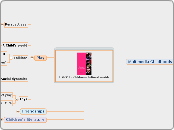
BLOCK 3 - Children's Cultural Worlds
Multimedia Childhoods
Childhood & the media
POSTMAN - Disappearance of Childhood (1983)
DON TAPSCOTT (1998)
Subtopic
VIDEO: Children's TV
Reflects adults changing perceptions of children
JOSHUA MEYROWITZ - No sense of place (1985)
Production: Targeting children
Proliferation of technology + commercially driven tv channels
Consequence
Children access previously forbidden material
Digital divide between rich & poor
Children seen as 'consumers'
Exploitation or empowerment?
Texts: Constructing children
Convergence
Multi-media marketing, merchandising e.g. Pokemon
Intertextuality
Texts draw on other media e.g. Simpsons, SMTV Live
Interactivity
CD Roms, internet - not just passive
Stephen Wagg - One I made earlier
Audiences: Children as readersundefined
Children seen as 'media literate' consumers
Easy to track visits to websites - target for advertising
Children seen as 'active agents' of media
children actively construct what it means to be a child
Integrating the analysis
'Power' of media lies in interaction of Production, Texts & Audiences e.g. Pokemon
Exploitation
Commercial manipulation - Marketed to appeal to children
Commerical exploitation e.g. encouraged to spend on collector cards
Empowerment
Market responds to demand
Games require interactivity
Use texts in their play
Consumption & Creativity
Play
Perspectives undefined
Historical - ROUSSEAU - free expression
Learning - PIAGET - opp. for children to practice emerging skills
FREUD - inner world of psyche revealed through play
G.H. MEAD - role play develops sense of self
Video: Pretend Play
A Child's worldundefined
Children's engagement with customs e.g. Halloween changes over time
Folkloreundefined
Peter & Iona OPIE
Video: Oakland+Chittagong clapping game
GUDGEON - observed new stereotype of femaleness ' girl power'
Social dynamicsundefined
Barrie THORNE - BORDERWORK ethnographic study of children's cultural worlds
Social or solitary - CHILDREN CREATE OWN MEANINGS & sense of idendity
Video: My Space - SEAN, TINCO, JOSHUA
Draws on patterns of inequality e.g. gender roles, social class & ethnicity
Toysundefined
Not necessary part of play
Mass production & marketing permeated children's culture
